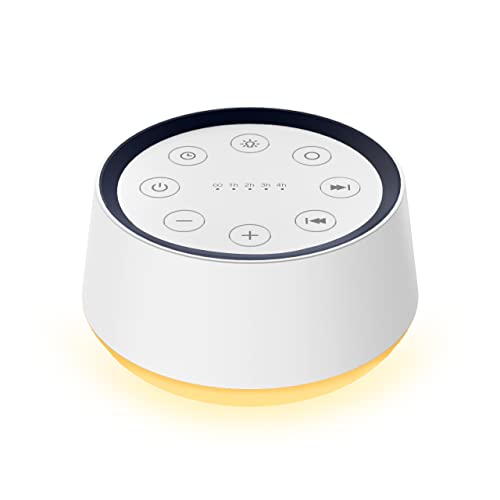As parents, we understand that getting a newborn to sleep all day can be challenging. However, with the proper strategies and guidance, it is possible to establish a peaceful sleep schedule for your little one.
But have you ever wondered what specific techniques can truly make a difference in ensuring your baby gets the rest they need? Stay tuned as we uncover practical tips that can transform your baby's sleep patterns and help you navigate the world of newborn slumber with confidence.
Key Takeaways
- Newborns sleep in short bursts, totaling 14-17 hours a day.
- Understanding baby's sleep cues helps establish healthy routines.
- Create a calm environment for daytime naps to regulate sleep patterns.
- Consult a healthcare provider for significant deviations in newborn's sleep patterns.

Brown Noise Sound Machine with 30 Soothing Sounds 12 Colors Night Light White Noise Machine for Adults Baby Kids Sleep Machines Memory Function 36 Volume Levels 5 Timers for Home Office Travel
❤[30 Natural and Soothing Sounds] Our white noise machine provides 30 soothing sounds, including 3 Brown noise, 2…
As an affiliate, we earn on qualifying purchases.
As an affiliate, we earn on qualifying purchases.
Newborn Sleep Patterns
Understanding a newborn's sleep patterns is essential for creating a nurturing and supportive environment for your little one. Babies sleep an average of 14-17 hours a day, typically in short 2-3 hour bursts. Their sleep patterns often involve frequent waking for feeding and diaper changes due to their small stomachs and high metabolic rates. Newborns have irregular sleep cycles, with more time spent in REM (rapid eye movement) sleep important for brain development.
It's normal for newborns to sleep throughout the day and night, interspersed with wakeful periods for feeding, bonding, and brief interactions. These irregular sleep patterns can be challenging for parents, but understanding them can help establish routines that cater to the baby's needs. By recognizing when your baby is most likely to be sleepy and ensuring a quiet, soothing environment for naps, you can support their healthy sleep habits. Embracing these sleep patterns is a valuable way to bond with your newborn and provide the care and attention they require during this critical stage of development.

SWEET DOLPHIN Baby Sleep Sack 0-6 Months – 100% Cotton 2-Way Zipper TOG 0.5 Infant Wearable Blanket, Newborn Essentials Toddler 3 Pack Sleeping Sacks – Grey
Ultra-Soft & Breathable Fabric Crafted from 100% cotton, our baby sleep sacks are designed to be incredibly soft,…
As an affiliate, we earn on qualifying purchases.
As an affiliate, we earn on qualifying purchases.
Safe Sleep Practices

To guarantee your newborn sleeps safely and soundly, always remember to place them on their back in a crib free of loose bedding or soft objects. This simple practice helps reduce the risk of SIDS, providing a safe sleep environment for your little one. Confirm the crib has a firm sleep surface, keeping it free from any items that could obstruct your baby's breathing.
Additionally, maintaining a comfortable temperature in the room is essential to prevent overheating. Remember to steer clear of secondhand smoke, as it can increase the chances of SIDS occurring. As recommended by the AAP, consider room-sharing without bed-sharing for the first 6 months to promote safe sleep practices.

Amazon Basics Portable Blackout Curtain Shade with Suction Cups, 50" W x 78" L, 1-Pack, Moon and Stars
ENERGY SAVING: These blackout curtains act as an insulating barrier
As an affiliate, we earn on qualifying purchases.
As an affiliate, we earn on qualifying purchases.
Establishing Healthy Sleep Habits

Moving from ensuring safe sleep practices for your newborn, let's now focus on establishing healthy sleep habits to support their well-being and development. When it comes to newborns, creating a consistent bedtime routine is key. This routine can include activities like bathing, changing, and reading, signaling to your baby that it's time to wind down and sleep. To aid in this process, it's beneficial to gradually associate nighttime with sleep, helping your little one understand the cues for rest. Additionally, adjusting the environment by controlling light and noise levels can create a soothing atmosphere conducive to better sleep habits.
To offer a quick reference, here's a helpful table outlining essential strategies for establishing healthy sleep habits in newborns:
| Strategies | Description |
|---|---|
| Routine | Implement a consistent bedtime routine involving calming activities. |
| Environment | Adjust light and noise levels in the sleeping area for optimal rest. |
| Association | Gradually associate nighttime with sleep cues to support healthy habits. |
| Flexibility | Maintain a flexible approach to accommodate your baby's changing needs. |

Safety 1st Deluxe Baby Healthcare and Grooming Kit, Arctic Blue, Newborn Baby Essentials, One Size, 25 Pieces
BABY GROOMING KIT: This baby care kit provides essential grooming tools for newborns and infants, including a toddler…
As an affiliate, we earn on qualifying purchases.
As an affiliate, we earn on qualifying purchases.
Daytime Sleep Strategies

For newborns, ensuring they get enough daytime sleep is essential for their overall well-being and development. Newborns need 14-17 hours of sleep per day, with short naps scattered throughout to reach this goal.
To encourage daytime sleep, create a calm environment similar to nighttime conditions. Establishing a consistent nap routine can help regulate their sleep patterns. Watch out for tired signs like eye rubbing, yawning, or fussiness, which indicate when your baby is ready for a nap.
When it's time for a nap, gentle methods such as swaddling, soothing sounds, or gentle rocking can help your newborn drift off to sleep during the day.
When to Seek Medical Advice

If you notice your newborn experiencing difficulty falling asleep or staying asleep, seeking medical advice is essential to address any potential underlying issues promptly. It's important to be attuned to your baby's sleep patterns and behaviors, as they can provide valuable insights into their overall well-being.
Here are some key signs that indicate it may be time to consult a healthcare provider:
- Consult a healthcare provider if your baby's sleep patterns greatly deviate from the norm.
- If your newborn is excessively fussy or irritable due to sleep disturbances, seek medical guidance.
- Contact a healthcare professional if your baby shows signs of discomfort or distress during sleep.
- Seek medical advice if your newborn is consistently having trouble settling down for sleep or staying asleep.
- If you have concerns about your newborn's sleep quality or duration, it's important to seek medical advice promptly.
Frequently Asked Questions
How Do I Get My Newborn to Stop Sleeping All Day?
We can help your newborn stop sleeping all day by encouraging brief wakeful periods during feedings and diaper changes. Creating a consistent sleep environment and engaging in interactive play can promote alertness and regulate their sleep-wake cycle.
Is It Normal for a Newborn to Want to Sleep All Day?
Yes, it's normal for newborns to desire sleep all day. They sleep to support their growth and development. Responding to their cues for sleep and feeding helps establish healthy patterns. Let's support their needs.
Why Is My Newborn Fighting Sleep All Day?
We comprehend newborns battling sleep all day can be challenging. Factors like hunger, discomfort, overstimulation, and growth spurts contribute. Recognizing individual cues helps identify reasons. We can assist you in managing this.
How Can I Keep My Newborn Awake Longer During the Day?
We can help our newborn stay awake longer during the day by engaging in stimulating activities, keeping the environment well-lit and active, feeding frequently, using gentle interaction, and promoting short awake periods. Consistency is key.
How Can I Establish Healthy Sleep Patterns for My Newborn Baby?
Establishing healthy newborn sleep patterns week can be challenging, but it’s important for your baby’s development. Start with a consistent bedtime routine, create a comfortable sleep environment, and respond to your baby’s cues. Over time, your little one will develop a healthy sleep schedule with your help.
Conclusion
In summary, aiding our newborn sleep all day is vital for their growth and development. By following safe sleep practices and establishing healthy habits, we can guarantee our little ones get the rest they need.
Remember, a well-rested baby is a happy baby, so let's prioritize their sleep for a brighter future ahead. As the saying goes, 'sleep like a baby' – let's make sure our newborns do just that.









